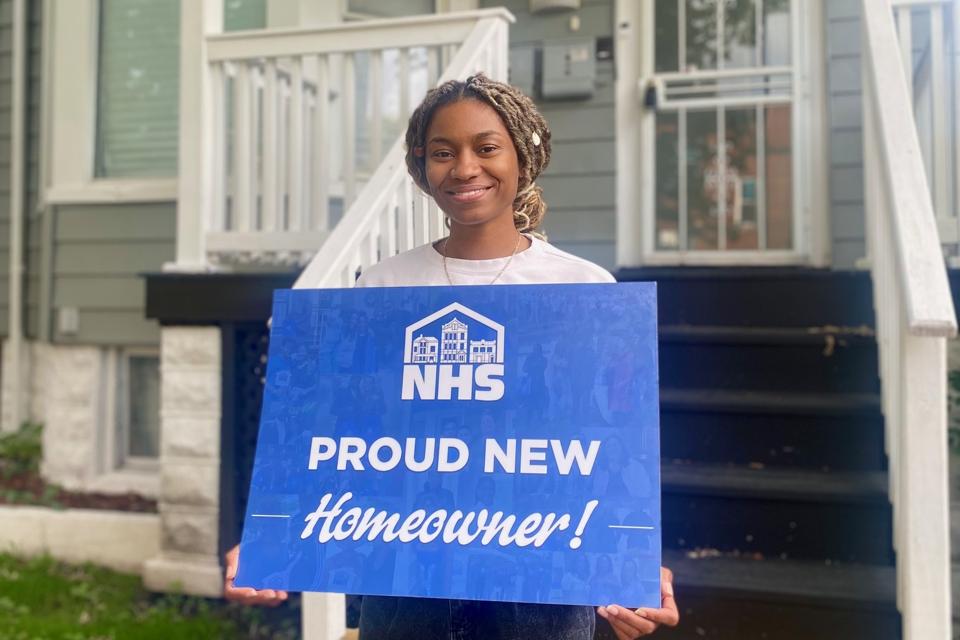Have you ever driven through a city and noticed how quickly the surroundings can shift? From well-maintained streets with smooth pavement, clean sidewalks, a community park for families, and thriving homes to neighborhoods marked by despair, neglect, and limited access to basic amenities like a grocery store?
Oftentimes, communities with greater financial resources benefit from better-maintained infrastructure, while lower-income neighborhoods are frequently left with deteriorating conditions and minimal reinvestment. The barriers to economic progress in Black communities are deeply rooted in historic practices like contract buying, redlining, appraisal bias and undervaluation, and predatory lending. Many of these disparities extract wealth and opportunity from underserved communities, rather than revitalize them, enriching outside investors instead of local residents.
Community Development Financial Institutions (CDFIs) such as Neighborhood Housing Services of Chicago (NHS), are nonprofit and community development lenders who have the ability to provide special products and programs designed to increase access to capital for those who traditional lending institutions underserve. The organization is actively investing in Black communities by addressing systemic disparities through housing resources, education, and grants that not only increase homeownership but also revitalize neighborhoods from within.
Families in disinvested communities often face crumbling infrastructure, unsafe housing, and the challenges of living in food deserts with few recreational spaces. These conditions harm residents’ health and well-being while also making homeownership—a key path to intergenerational wealth—difficult to attain. Over the last five years, NHS has closed over $16 million in home loans resulting in 977 new homeowners in the Chicago area and prevented 384 families from foreclosure, helping them preserve their homes and maintain stability in the communities they’ve long called home.
NHS’s Next Level program is designed to go beyond traditional homeownership education, expanding into vital areas such as real estate investing, entrepreneurship, financial markets, and estate planning. Additionally, the organization partnered with the Chicago Community Trust, Chase Bank, and the Woodstock Institute to provide NHS Equitable Mortgage products that increases access to mortgage credit and consumer buying power for Black and underrepresented households.
“We believe that a strategic approach which creates a resource ecosystem of comprehensive financial education, equitable access to capital and access to quality affordable homes and real estate assets is the key to revitalizing neighborhoods, preserving cultural legacies and promoting the building of generational wealth for Black families and neighborhoods,” said Anthony E. Simpkins, CEO of NHS.
One of NHS’s clients, Tameah Foley, a 29-year-old Chicago native, fulfilled her dream of becoming a multi-unit homeowner in the Chatham neighborhood—a goal rooted in her desire to build generational wealth and offer affordable housing in her community. She prepared for homeownership by completing NHS’s Home Buyer Education and Landlord Training courses, which equipped her with essential knowledge and confidence. With support from an NHS grant, Tameah closed on her two-flat in August 2023. With over 8,000 residents benefiting from the organization’s homebuyer education and counseling services, Tameah’s journey reflects the power of accessible resources, financial education, and community investment in turning the dream of homeownership into a reality.
Homeownership plays a critical role in the upkeep and long-term vitality of neighborhoods. When residents have a stake in where they live, they are more likely to invest in maintaining their homes and surroundings, contributing to safer, more stable, and vibrant communities. CDFIs recognize this connection between homeownership, neighborhood revitalization, and wealth creation, which is why they offer programs, education, and resources designed to empower residents rather than displace them.
“Our goal is to promote investment that is not extractive, nor drives displacement, but instead helps families stay rooted in community and transfer wealth intergenerationally, preserving cultural and historic community legacies,” said Simpkins.
As communities navigate today’s pressing challenges, funders and policymakers have a critical opportunity to invest in CDFIs to drive homeownership, support Black entrepreneurship, and advance neighborhood revitalization that aligns with communities’ values and needs.
“This is not charity; it’s a proven and sound business strategy that produces both economic and social returns by creating thriving, income-diverse communities that improve economic outcomes for everyone,” said Simpkins. “It’s also how we close the racial wealth gap and repair the damage resulting from generations of disinvestment. And it’s how we build a more inclusive, resilient economy for everyone.”
NHS’s work in housing reflects the vision and values of the African American Alliance of CDFI CEOs (The Alliance), a national organization committed to advancing economic justice and empowering Black-led CDFIs to close the racial wealth gap nationwide.
As a proud member of The Alliance, NHS is part of a movement working to ensure that community-rooted solutions like theirs are supported, scaled, and sustained. Their membership reinforces a collective mission to reclaim our blocks – not just with brick and mortar, but with equity, dignity, and opportunity. To learn more about NHS’s impact and commitment to revitalizing neighborhoods without displacement, visit nhschicago.org.

